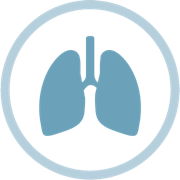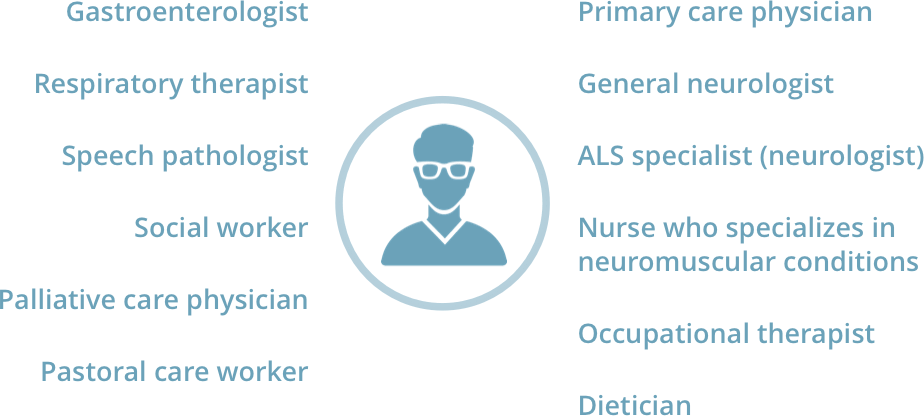Keep Up the Conversation
Communicating With Your Care Team
It’s extremely important to stay in contact with your healthcare provider(s).
Communicating regularly will help them monitor your disease progression, manage any symptoms you may be experiencing, and connect you with information and resources you may need.
Communicating regularly will help them monitor your disease progression, manage any symptoms you may be experiencing, and connect you with information and resources you may need.
Your loved ones are also a vital source of support. They can help assist you with physically demanding tasks and also serve as an emotional lifeline.
Enhancing Quality of Life
Learn About Helpful Interventions
As ALS progresses, the muscles that help with certain functions like eating and breathing can weaken, making these tasks particularly challenging. Not only are these functions necessary to maintain your quality of life, but they also can reduce your survival time if not managed properly.1-4
Below are some interventions you can choose to stay ahead of your disease. It’s important to remember that, before making any lifestyle changes, you should first speak with your healthcare provider(s).
Below are some interventions you can choose to stay ahead of your disease. It’s important to remember that, before making any lifestyle changes, you should first speak with your healthcare provider(s).

Why It’s Important:
People with ALS often face challenges with malnutrition. This can happen because of weight loss, problems eating, increased energy needs, and muscle loss. As many as 55% of people with ALS may experience malnutrition.
Taking the Right Steps:
If you can still chew and swallow safely, consume foods and liquids high in calories and high in protein.
If eating and drinking are considered unsafe, your healthcare team may consider a percutaneous endoscopic gastrostomy (PEG) tube, which is a small tube that is inserted directly into the stomach to provide a means of delivering food, liquid, and medications. Most people find PEG tubes much more comfortable and convenient than they originally thought.
People with ALS often face challenges with malnutrition. This can happen because of weight loss, problems eating, increased energy needs, and muscle loss. As many as 55% of people with ALS may experience malnutrition.
Taking the Right Steps:
If you can still chew and swallow safely, consume foods and liquids high in calories and high in protein.
If eating and drinking are considered unsafe, your healthcare team may consider a percutaneous endoscopic gastrostomy (PEG) tube, which is a small tube that is inserted directly into the stomach to provide a means of delivering food, liquid, and medications. Most people find PEG tubes much more comfortable and convenient than they originally thought.

Why It’s Important:
As the muscles involved in respiration (breathing) weaken, it becomes harder to breathe. Symptoms may include gasping for air, fatigue, frequent yawning, morning headache, insomnia, and difficulty lying flat. Respiratory failure is the leading cause of death in ALS, so it's important to intervene early.
Taking the Right Steps:
Noninvasive ventilation (NIV) can assist with breathing by using air to expand the lungs. This can be done via a face mask or nasal pillow and is intended as part-time respiratory support. Starting NIV earlier as opposed to later, when respiratory function worsens, has been shown to prolong survival.
Many patients eventually require invasive ventilation that supports the entire respiratory system. This form of respiration requires the surgical insertion of a tracheostomy tube into the neck.
As the muscles involved in respiration (breathing) weaken, it becomes harder to breathe. Symptoms may include gasping for air, fatigue, frequent yawning, morning headache, insomnia, and difficulty lying flat. Respiratory failure is the leading cause of death in ALS, so it's important to intervene early.
Taking the Right Steps:
Noninvasive ventilation (NIV) can assist with breathing by using air to expand the lungs. This can be done via a face mask or nasal pillow and is intended as part-time respiratory support. Starting NIV earlier as opposed to later, when respiratory function worsens, has been shown to prolong survival.
Many patients eventually require invasive ventilation that supports the entire respiratory system. This form of respiration requires the surgical insertion of a tracheostomy tube into the neck.
Tips for Managing ALS*
You're not defined by your ALS. These tips may help you cope with and manage your disease.

Set personal goals
Decide which goals and aspirations are most important to you, and stick to them. Concentrate on the people and things you love.
Decide which goals and aspirations are most important to you, and stick to them. Concentrate on the people and things you love.

Ask for help
If you ever have a question or need help with a task, don't hesitate to ask your healthcare provider(s) and/or caregiver.
If you ever have a question or need help with a task, don't hesitate to ask your healthcare provider(s) and/or caregiver.

Plan your next steps
Before leaving the house, always double check you have what you need to be prepared.
Before leaving the house, always double check you have what you need to be prepared.

Stay social
Surround yourself with family, friends, and the things you love.
Surround yourself with family, friends, and the things you love.

Customize your home
Consider modifying your home to be more accessible and easier to navigate.
Consider modifying your home to be more accessible and easier to navigate.

Explore assistive devices
There are many types of equipment that can help you maintain your independence for longer and be more comfortable.
There are many types of equipment that can help you maintain your independence for longer and be more comfortable.

Set up a treatment plan
Work with your healthcare provider(s) to see what interventions and treatment options may be appropriate.
Work with your healthcare provider(s) to see what interventions and treatment options may be appropriate.

Consider your mental health
A trained professional can help you and your loved ones cope with any emotions you're feeling.
A trained professional can help you and your loved ones cope with any emotions you're feeling.
Speak with your healthcare provider(s) about ALS organizations and patient-service groups available online and in your area.
*Tanabe Pharma America, Inc. does not provide medical advice, diagnosis, or treatment. The health information contained herein is provided for general educational purposes only. Your healthcare professional is the best source of information regarding your health. Please consult your healthcare professional if you have any questions about your health or treatment.
Treatment Options
Ask About ALS Treatment Options
Beyond choosing interventions to assist with nutritional intake and breathing, there are different approaches that your healthcare provider(s) may prescribe or recommend as options to treat your disease.
Unfortunately, there is no cure for ALS, but you can work with your healthcare provider(s) to find treatments that can help you.
ALS Clinics
The Benefit of Working With a Clinical Team6
In addition to working with your doctor or neurologist, you can find many experts under one roof at an ALS Association Certified Center, which is commonly called an ALS clinic. These clinics are located across the country, giving people living with ALS access to some of the best ALS healthcare provider(s).
Each expert becomes a collaborative member of your personal care team. The goal of this team should be to work together to come up with and maintain a care plan that best fits your needs, not merely treat the disease.
Each expert becomes a collaborative member of your personal care team. The goal of this team should be to work together to come up with and maintain a care plan that best fits your needs, not merely treat the disease.
Multidisciplinary care can prolong survival time and help improve your mental and social well-being.6
Your multidisciplinary team may include

To find a certified clinic or center in your area, visit
www.alsa.org/
local-support/certified-centers-clinics/locator
local-support/certified-centers-clinics/locator

Gastroenterologist
Respiratory therapist
Speech pathologist
Social worker
Palliative care physician
Pastoral care worker
Primary care physician
General neurologist
ALS specialist (neurologist)
Nurse who specializes in neuromuscular conditions
Occupational therapist
Dietician
To find a certified clinic or center in your area, visit
www.als.org/local-support/certified-centers-clinics/locator
www.als.org/local-support/certified-centers-clinics/locator
Keep Track of Your Healthcare Team
As you continue your journey with ALS and work with your healthcare team or ALS clinic, you’re going to come across many healthcare providers. It’s important to keep their contact information in a centralized location so you can reference the right person when needed.
For each person you meet, it’s important to write down the following information:
Name: ex. John Smith
Specialty: ex. Respiratory therapist
Contact Information: ex. 555-5555, JohnSmith@email.com
Notes: Use this area to fill in any important information provided by your healthcare provider(s), such as tips, instructions, or next steps.
For each person you meet, it’s important to write down the following information:
Name: ex. John Smith
Specialty: ex. Respiratory therapist
Contact Information: ex. 555-5555, JohnSmith@email.com
Notes: Use this area to fill in any important information provided by your healthcare provider(s), such as tips, instructions, or next steps.

Download a print-friendly sheet to organize your contact information.
Tanabe Pharma America, Inc. does not provide medical advice, diagnosis, or treatment. The health information contained herein is provided for general educational purposes only. Your healthcare professional is the best source of information regarding your health. Please consult your healthcare professional if you have any questions about your health or treatment.
References: 1. Malnutrition in Amyotrophic Lateral Sclerosis. MDPI website. https://pmc.ncbi.nlm.nih.gov/articles/PMC11356978/pdf/nutrients-16-02625.pdf. Published August 2024. Accessed October 14, 2025. 2. Nutrition Considerations for People with ALS. ALS Clinic University of Pittsburgh website. https://www.alsclinic.pitt.edu/patient-issues/nutrition-considerations-people-als. Accessed October 24, 2025 3. Miller RG, Jackson CE, Kasarskis EJ, et al. Practice Parameter update: The care of the patient with amyotrophic lateral sclerosis: Drug, nutritional, and respiratory therapies (an evidence-based review). Neurology. 2009;73(15):1218-1226. 4. Lou J-S, Moore D, Gordon PH, et al. Correlates of quality of life in ALS: Lessons from the minocycline study. Amyotroph Lateral Scler. 2010;11(1-2):116-121. 5. FYI: Breathing Difficulties. ALS Association Website. https://www.als.org/navigating-als/resources/fyi-breathing-difficulties. Accessed October 14, 2025. 6. Traynor BJ, Alexander M, Corr B, et al. Effect of a multidisciplinary amyotrophic lateral sclerosis (ALS) clinic on ALS survival: a population based study, 1996-2000. J Neurol Neurosurg Psychiatry. 2003;74(9):1258-1261. 7. Van den Berg JP, Kalmijn S, Lindeman E, et al. Multidisciplinary ALS care improves quality of life in patients with ALS. Neurology. 2005;65(8):1264-1267.


